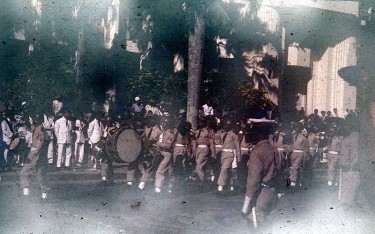A Civil Society Initiative has been set up to preserve the ‘collective memory’ of Madagascar by digitally archiving videos detailing its, often controversial, history. Reasons for controversy include disagreement over the tragedy of the 1947 Malagasy Uprising, a perspective limited by language, as well as destruction of historical archives during political crises.
The Fl@H Association [fr] was set up to preserve Madagascar’s audiovideo heritage and aims to be a force for the preservation of the country’s history. AudioVideo professional members have set a target of digitising approximately 600 hours of film on Madagascar and can already point to several achievements.
Monique Razafy Rahajarizafy gave details of these [fr] on website No Comment:
Près de 1 400 bobines de films, représentant 600 heures d’images en formats 16 et 35 mm, sont actuellement restaurées, regroupées et numérisées [..] Un travail de longue haleine, commencé en 2007, et pour lequel Fl@h s’est vu décerner à Dublin, en 2010, le prix du Meilleur projet de sauvegarde d'archives audiovisuelles, décerné par la Fédération internationale des archives de télévision. À son actif, la réhabilitation des Actualités de Madagascar, des films jadis diffusées en avant-programme dans les cinémas et couvrant toutes les années cinquante jusqu’à la proclamation de l’indépendance. Un capital inestimable, faisant de Madagascar l’un des rares pays africains à avoir encore les images de son indépendance…
A film of the Declaration of Independence of Madagascar [fr] in 1960 was presented by Tsilavina Ralaindimby in Paris on its anniversary (proclamation of the Republic on October 14):
At a TEDx event in the largest city in Madagascar, one of the members of the Fl@H Association spoke about why these archives are so important, highlighting the “common good” and the need to make people aware of their responsibilities [fr]:
However, the project risks a period of prolonged inactivity due to lack of finance. The Fl@H Association functions thanks to the financial and technical support of foundations and donors. Monique Razafy Rahajarizafy of No Comment detailed [fr]:
Grâce à l’appui financier de la Coopération française, on a pu s’en procurer une d’occasion à 20 000 euros et on a également bénéficié du soutien technique de l’Institut national de l’audiovisuel (INA) pour la formation de nos techniciens
To find solutions which will allow them to continue without relying on external funding, the Fl@H Association presented their work to the International Federation of Television Archives at a British Library conference held from September 28 to October 1, 2012.
Patrick Sweeney reminded attendees that October 27 is the UNESCO supported World Day for AudioVisual Heritage, stating that:
This is your opportunity to draw attention to the importance and significance of your archive, the work you do and the issues you want to promote. The 2012 theme draws particular attention to the crisis of time for archives worldwide to save and preserve this precious heritage. Tell the world what you are doing on this day to raise awareness and promote your archive.
This UNESCO video shows archive footage of historic events over the last 50 years:








1 comment